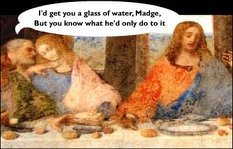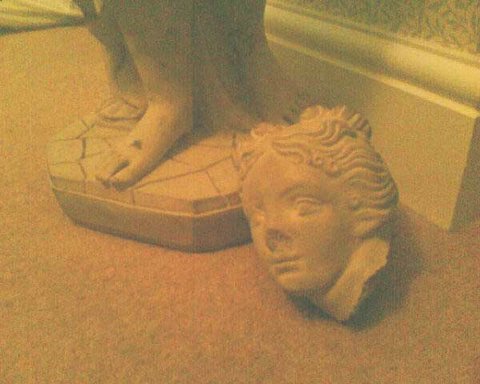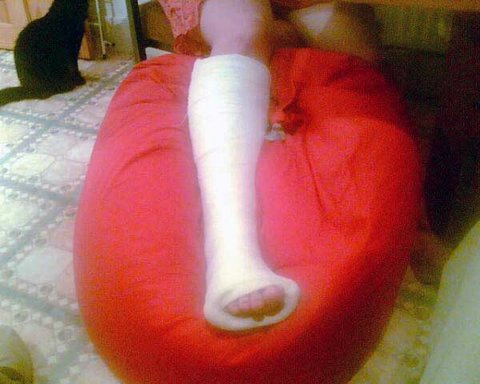Do mind the spoilers.
In fact, it probably won't make any sense unless you've seen the film.
And even then, not a lot.
There are a handful of things that irritated me:
It's not very clever
We're talking about a multi-million bestseller, so it's got to have been accessible in the first place. But this huge secret that the greatest scholars of the past millennia have kept safe, and which the church and various crackpot millionairres are desperate to locate, is hidden behind a few word games and anagrams no more complex than anything you'd find in a weekly puzzle magazine.
Don't believe me? It takes Tom Hanks a couple of days to crack it all.
Oh, there are nods to research and history, and there is a bit where Hanks says he needs a library. We'll ignore the fact that he's in central London and the best library he can think of is in Chelsea, forgetting that he's nearer one containing all the books ever published. The big fool. He doesn't go to the library anyway because he gets his answer by googling with a mobile.
What really bothers is the idea that any given symbol stands for one particular thing. It's what you get in puzzle magazines because it makes it easier for the person solving the puzzle. But symbols can mean all sorts of things. For example, depending on context, the sun can mean: male, light, summer, heat, day, fire, royalty, time, that the tennis will be okay...
 Since symbols can mean different things, there are all sorts of readings to be made. Maybe Leonardo did mean something particular by not putting any wine glasses in his Last Supper. Maybe he just didn't want people thinking it was one of those sorts of party.
Since symbols can mean different things, there are all sorts of readings to be made. Maybe Leonardo did mean something particular by not putting any wine glasses in his Last Supper. Maybe he just didn't want people thinking it was one of those sorts of party.Likewise, "paganism" isn't just one religion. It describes many different kinds of religion, both historically and now. That the Romans had such a pantheistic view allowed them to embrace all kinds of beliefs. So claiming the pentacle as a specific emblem of a specific kind of religion is to reduce everything down to something simple and plot-convenient.
Anyway, it's not a pentacle, because the "pent" bit means it'd have five points, not six. And that would rather overturn a fundamental part of the solution, wouldn't it?
Don't trust authority
It would be Leonardo, wouldn't it? Not Masaccio or Fra Angelico, or anyone else slightly less well known. And the clues are in Leo's more famous paintings, too. That's helpful. And Isaac Newton was in on it too. And you always knew the police and the church were up to no good, didn't you?
Thing is, it does make a very good case against religion. The lecture on the early church is not just pretty much verifiable, it's the most damaging to those who take doctrine very seriously. Many of the most crucial bits of dogma were agreed in committees and/or by killing anyone who disagreed. Applying historical scrutiny to the church collapses the absolutes, and also begs questions about why the church isn't more about what Jesus actually said...
But the film's keen not to get at the church too much. At first it looks like all of Christianity's in on the plot. Then it's just the Catholics. No, then it's Opus Dei. No, then it's just an unofficial splinter group who's efforts are so not what the rest of the church would approve of that they'll be excommunicated if they're caught. And no, it's not even them. It's just Alfred Molina running the show.
But no, he's just the mug of someone else, who's really just trying to bring down the church...
So by the end of the film it's rather as if there's isn't some great big conspiracy because it's all unravelled. That policeman didn't mean to beat up that innocent air traffic bloke. He just thought Jesus wanted him to do it, and now he knows better.
What really bothered me was that it fails to deal with what faith actually means to people. The baddie albino is taking his faith too far, it seems. Tom Hanks used to believe when he was in trouble, and now having established that Jesus had a wife and kids he believes in him all the more... Er, why?
Because the truly sensational thing about Jesus having a family is that it makes him more of an ordinary bloke. He's more like us, and less like a superhero. What he said and did suddenly relates much more to our own everyday lives. His best mate was jealous of his wife, for example. And (like the couple in Ever Decreasing Circles) the Jesuses dined out in matching clothes.
But the Da Vinci Code isn't interested in ordinary people and how faith affects them. We don't know anything about Hanks or Tatou that's not revealed to be part of the plot. Compare them to the characters in The Second Coming, where everything is about the affect on ordinary people, and God reveals his majesty at the football and down the pub.
All you need is blood
Himmler was very taken by the Holy Grail mythology, and the history of the teutonic knights. Jesus's 500x great-granddaughter will have had her blood somewhat diluted over the millennia. And she's no more special than the monarchy rules by divine right.
There's some sport made that she might have inherited healing powers in her fingertips, but can't (yet) walk on water. But of course the film can't say anything definitively because that proof would deny the faith so necessary for the final shot of the film.
What is Tom Hanks actually doing? Praying to the husband of the dead woman he's just found? Because discovering the bloke had a kid suddenly restores all his faith?
And what's Audrey Tatou going to do now? Surely she needs to have babies to continue the all-important line. So is she destined for frolicksome rituals like she caught her "grandfather" at? Did you see the look of them villagers she's staying with?
Rather her than me...
















